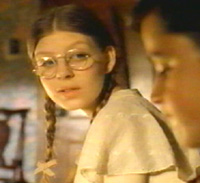

















Interview with Amber Benson
Dec 7, 2003, Offenbach
1. Magic, Multitasking and Motivation
3. Being in control
4. "Chance", Sex and Power
5. The Technicalities of Being Inspired
6. Reading, Collaborating, Watching & Listening
I’ ve been looking at some of your feature film appearances – there’s King of the Hill, and then there was The Prime Gig, where we do not even get a full scene, although you steal one of the scenes with "the grin". Would you care to elaborate on some of the differences between movies and television work?
Well, in films you get more time to rehearse and kind of come up with the character over an extended period of thime whereas with "Buffy" it was like being thrown in. You may need – and even get – three months to get into the space of a film. On "Buffy" I had three years but I was thrown into it, you have to create the character like that (snaps), create the feeling like that (snaps), there was no rehearsal time. You go in and then you do it. It can be overwhelming sometimes. I know a lot of actors who like to prepare and work on it. They can’t do it, because you get the script the night before and there’s no time. I did some other television work, a little bit of stuff, little guest pieces here and there but nothing as intense. "Buffy" is really like making a little movie – without the time. You get eight days. "Buffy" is one of the very few shows that were actually shot on 35mm. Most shows are shot on 16 or High Def. Buffy was shot on 35mm and then transferred to video. That influences the quality, the look, it makes it dark and beautiful and rich.
Current and upcoming feature film projects? (Meanwhile, since this interview was conducted, a new movie called "Latter Days" starring Gordon-Levitt , Erik Palladino, Rob McElhenney and AB has been released – www.latterdaysmovie.com)
I just did an independent film called "Held Together" which will be making the independent film circuit. And then we’ re here in pre-production, preparing a film that we will shoot in Manchester in the summer called "Watchful Eyes". It’s a futuristic cop drama, I get to shoot people, it’s very exciting.
Most people who’ve ordered and seen "Chance" are probably aware of the committed way your family supports you. Doesn’t seem very Hollywood. In what ways does this support shape the art itself?
You look at artistry throughout the ages and you see these people that focus on their work. They had, you know, patrons. These patrons would buy their products or give them money or harbor them so they could continue with the creation of art. Now you don’t have that. Now you have people struggling to eke out a living as an artist and having to do other jobs. They’re suffering because they’re not able to financially survive. I have this support system where I get to do what I want and have people around me who act like my patrons.
Like the King of France.
Exactly. My mother, my sister, my dad: my family, they’re the fiefdom of Benson. Having the support of people around you, you’re not tempted. I’ m not tempted to experiment with drugs or alcohol ot other ways of getting away from myself. I have a goal. I don’t need to blow my mind out to be creative. I know what I want, I have support, and I’m not nervous about it or worried about it.
When and how did the career start?
I’ve been doing this since I was a little kid. Theatre, dancing… that’s how I’ve gotten into this. I didn’t like the dancing, I liked the applause. And there was and is a need to create, but all the stuff that goes with the creation process can at first be a bit overwhelming.
"Chance" seems to be one of the very few films, comic books, novels, works of art in general about post-adolescent concerns in which any real attempt is made to incorporate the parents’ experience. Usually they’re just a foil, messing with the heroes’ lives and suchlike…
Because my situation is such that I have good relationship with my family, so many people that I know in Hollywood, they look at me and say: what’s wrong with you that you’re 26 years old and you still live at home, you’re close to your mother and your sister and your father? And I’ m like: this is what it was like for centuries. People lived with their families, there were these huge family units working together to survive. Now you feel like you have to destroy this relationship to be independent. But independence is not just empowering as such, it can make it impossible to do what you want to do because you’re just fighting to survive on your own. There’s no help.
And you can be easily manipulated. You might have to jump through hoops.
[D. Benson: But we raised you to be independent].
Yeah, but it’s not this kind of independence, it’s autonomy, self-reliance. Not having someone else controlling your life, which is not the same as supporting you of course. I don’t have anybody controlling my life. We’re all working together to get the farm going, it’s like communism in reality.
"Communism in reality": sounds like "Magical realism" again.
That exists at our house.
> back to top
> Part 3


